On Sunday, June 9th we (Shell Out Sounds) completed a trilogy of visits to the South Bank Centre, for a melodic hearts and minds intervention on the subject of Shell sponsorship. Here’s my side of the story:
(All photos from the day by Vita Brown)
Flash back to the end of April 2013…
The next step in the plan we put together at the outset was to call a public ‘flashmob choir’ for the final concert in the Shell Classic season on the afternoon of Sunday June 9th, outside the QEH. As of the eve of May, it was still unclear whether we will opt for ‘Imagine’, another Lennon song, or something else entirely. The Lennon link would be in order perhaps to provoke a response from Yoko Ono, arch-opponent of fracking in New York City (and founder of ‘Artists Against Fracking’: http://artistsagainstfracking.com), whose Meltdown Festival is due to start a week later. (Shell is a highly energetic fracker.) The main issue with ‘Imagine’ is that many people hate it, and that it would likely to come across as a dirge unless radically…reimagined.
Chris compiled a fascinating list of Yoko’s artworks, one of which was ‘Art is a means for survival’, which inspired me to write a piece. Well, I would have got down to it, (I tell myself), if he hadn’t then come up with a rather brilliant rewrite of Leonard Cohen’s ‘Hallelujah’, which loses the original’s extraordinary sensual mystery, but imbues our campaign with a stately melancholy. And it’s a song almost everyone knows. Our first rehearsal of this piece drew two people: me with my guitar, and someone who was, understandably, too shy to sing. So I got to sing it a couple of times, and we wrestled not entirely satisfactorily with the opening lines, finally changing
‘I dreamed I’d seen the Earth before
It was blue, and it pleased the Lord
But you don’t really care for humans, do ya?’
to
‘I dreamed we’d save the earth before,
We’d worked so hard, and it pleased us all,
But you don’t really care for humans, do ya?’
(which was later later reverted to
‘I dreamed we’d seen the Earth before
It was green, and it pleased us all,
But you don’t really care for humans, do ya?’)
Then I got to work recording a version to allow others to sing along and learn some of the wry pauses that I think make it more wryly expressive, (though as to whether such pauses will work with a flashmob choir, I’m less sure.) Apart from experimenting with backing vocals, messing with Logic’s Varispeed option took up most of the time, as my original was erring on the lugubrious. Having spent perhaps a little too much time in my kind-of studio, we gathered again the following week (this time 5 of us), rewrote the words again and transposed the song to a friendlier key, rendering my recording somewhat pointless. I recorded this latest version, this time more simply (and possibly more effectively, this time with a twin melodica solo), an experience which took far less time and was far more enjoyable.
Not singing a Lennon or a Yoko piece meant we weren’t perhaps pushing hard enough on the potential opening that her presence presented us with. I hoped a banner reading ‘Art is a means for survival’ might counter that a little. Trouble is, I wasn’t volunteering to do it myself, since I was busy with assignments, and almost every other area of this foray, (control freakery alive and well, perhaps?) Luckily, Chris wasn’t feeling well enough to keep on trekking down to London for these microcosmic rehearsals, so he took on making the Yoko banner, which looked absolutely beautiful when I finally saw it on the day of the performance, partly because he had reproduced perfectly her very distinctive font:
The remainder of the time left before June 9th was spent pumping the word out about the event, and having our weekly practices. There was a sense, to me at least, that friends were slipping away and leaving an increasingly tiny core of possibly crazy – certainly foolish – singers-cum-campaigners. I write it in this slightly apologetic and downbeat way, because on the day there were about fifteen people for the practice at The Calder Bookshop from midday, some of whom I – extraordinarily! – didn’t know. And when we got to the South Bank, we had swelled to about twenty five.
At the back of the bookshop, (a curious space that was made up of a small stage and theatre seating), I ran a warm-up presaged by the statement that many people might expect people like us to be deadly serious, and that one amazing weapon at our disposal was the ability to be silly. After that we goofed our bodies into sing-readiness, I attempted an exercise I’d learnt from my years with Songlines, which went OK until I tried to create a round with it.
Lastly we ran an exercise I came up with a few months previously called ‘How does Shell Out sound?’, where the suggestions ranged from “shy”, through “sexy” to “rockin’” which seemed to work OK, despite the fact that we were a group of relative strangers making fools of ourselves in an alien space.
Since the hoped-for string trio didn’t materialise, my guitar became the only instrument. The Friday before this Sunday, the wonderful Danny had suggested a very simple but extraordinarily effective arrangement for the chorus, and this in itself managed to lift the piece from worthy to – it seemed to my ears – verging on the enchanting.
We designed a flash-choir (or, since we would be wearing purple sashes, a ‘sash-mob’, as someone wisecracked beautifully) opening that entailed me walking onto the stage in the foyer of the Queen Elizabeth Hall (QEH), setting up my little red practice amp and starting to play the opening chords, almost absent-mindedly, until 3 singers wandered on to join me and to sing the chorus in a kind of delicate, magical round. Then the rest of the choir walked on gradually until we were ready to sing verse one all together.
The reaction of the Southbank Centre was interesting: as I was setting myself up on the stage in front of a small number of people drinking their afternoon tea and perhaps waiting for the concert to start, a man walked up to me and asked me if I wanted to sing a song. I said ‘Yes indeed’ or similar, and he said ‘That’s fine’ and left us to it. Outside, we sang again, then moved swiftly to the Nelson Mandela statue outside the Royal Festival Hall,
where it was rumoured that SBC Jude Kelly was waiting to hear us there. On the way, at Danny’s suggestion, I launched into our ‘back-up song’: Crosby, Stills & Nash’s ‘Find the Cost of Freedom’, which is a rousing piece, but I had the impression as we walked past people sitting outside in the RFH café that we seemed not a little like a straggly group of evangelicals out on a Sunday jaunt.
I thought a small shortcut into the RFH and past the Shell fossil installation there
might be a good place to sing the final verse, unexpectedly:
We went down to the concert hall,
With the name of Shell upon the wall,
Art and oil don’t mix we can assure you,
It goes like this, a song, a plea,
Till our concert halls are fossil free,
Our voices will be singing Hallelujah!’
…but it was a little ragged, and I realised soon enough that most of the choir was already standing in front of Nelson “the struggle is my life” Mandela, and there was no sign of Jude K. Oops. We sang there though with passion, and a good response, and ended with a few quick explanations of why we were there: to expose Shell, and, not least, to welcome arch-fracker Yoko Ono.
This is a quote from our press release: ‘This is the last concert in this season of Shell Classic International concerts, and while the Southbank already has the next set of concerts planned, it really should look long and hard at whether this association is sullying its otherwise terrific reputation. Shell is buying into the reputation of renowned musicians for a small price and co-opting powerful, peace-promoting music, such as Britten’s Sinfonia da Requiem and Strauss’s Metamorphosen, as a smokescreen for its injustices elsewhere.’
Chris attended the Q&A with the musicians (Spira Mirabilis), where he raised the irony of the subject matter of the piece and the activities of the sponsor. That raised some applause, and a few groans, but most significantly, one of the musicians later decried the groans, even though he disagreed with Chris’ implication that the Southbank should part company with Shell. He later had an interesting discussion with Jude Kelly, who said we were doing the right thing at the right time, which is hard to know how to interpret: is it encouragement, or politic soothing of a small but determined irritant?
Overall, it felt that the advice I had been given along the way: to keep on keeping on, in short, despite low morale, was absolutely spot on, because not only did we create a relaxed, collaborative atmosphere between singers of all abilities, we seemed to make a positive impact, and even, from time to time, an enchanting sound.
The Shell Classic International series is now over until October, but there’s no shortage of opportunities for conscious singing in contentious places, so who knows, perhaps we will pop up sometime before then, and go slowly from strength to strength…

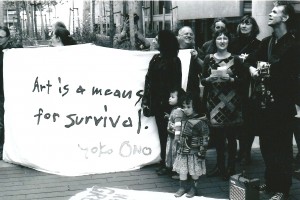
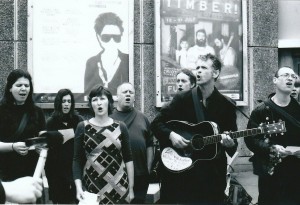

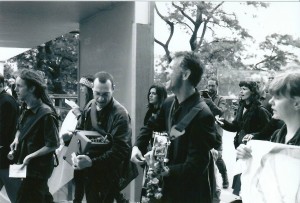
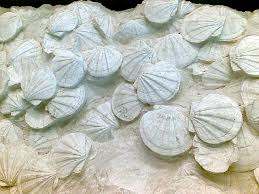
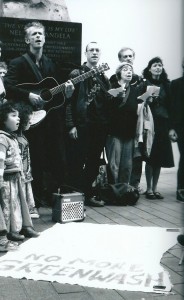
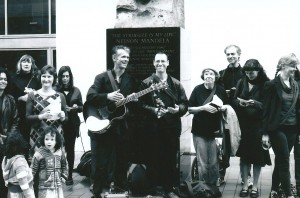
Pingback: Royal Dutch Shell Hallelujah – Royal Dutch Shell plc .com